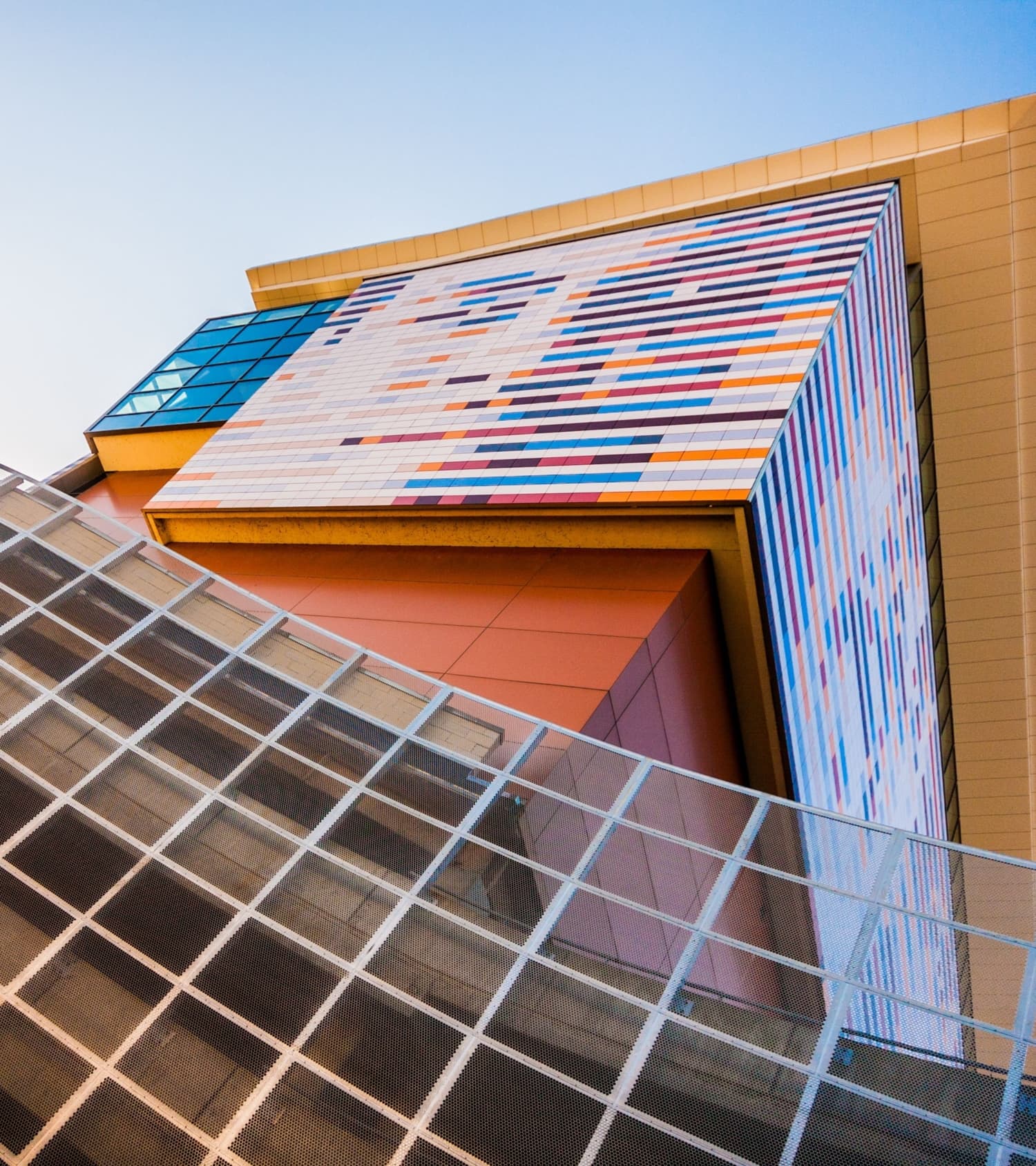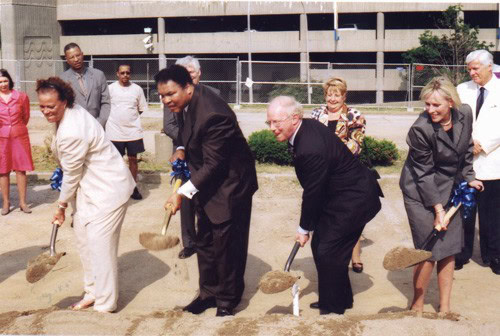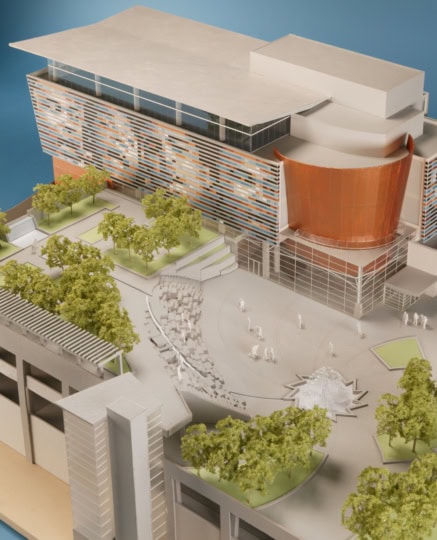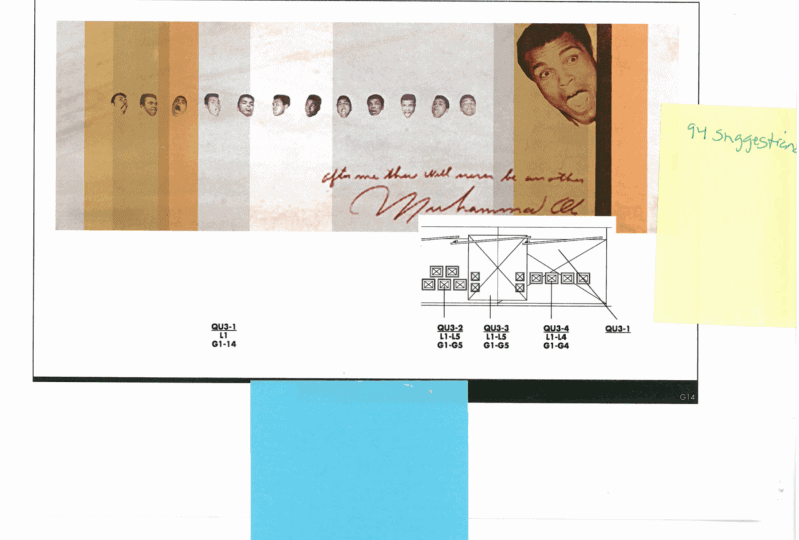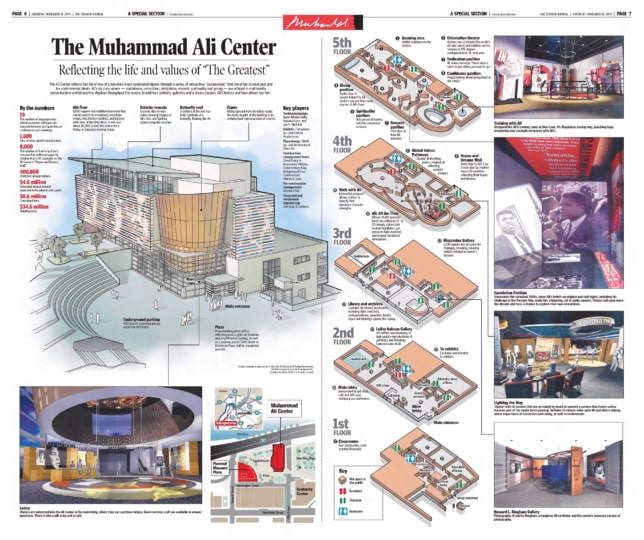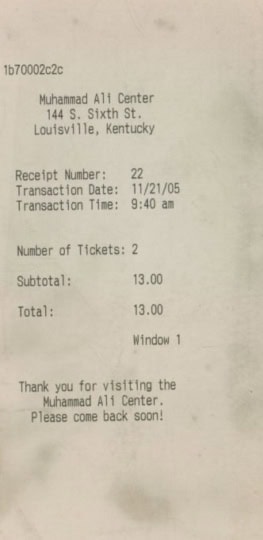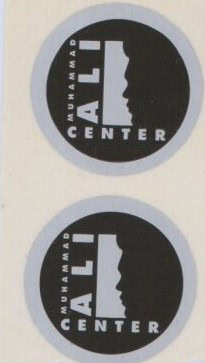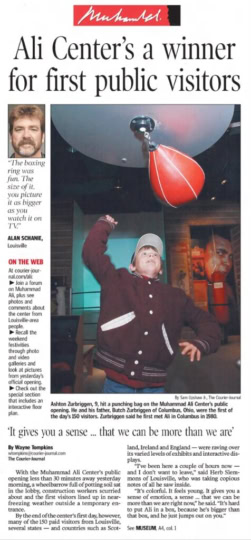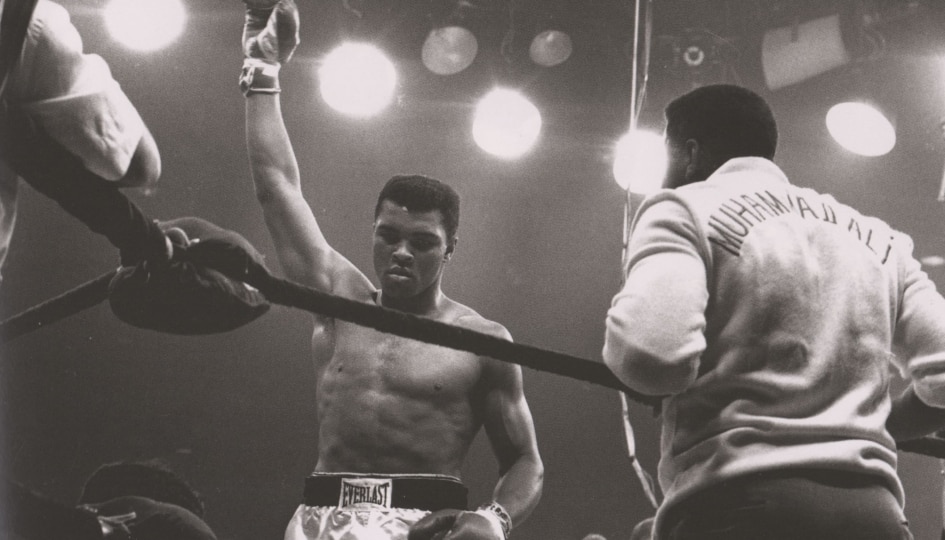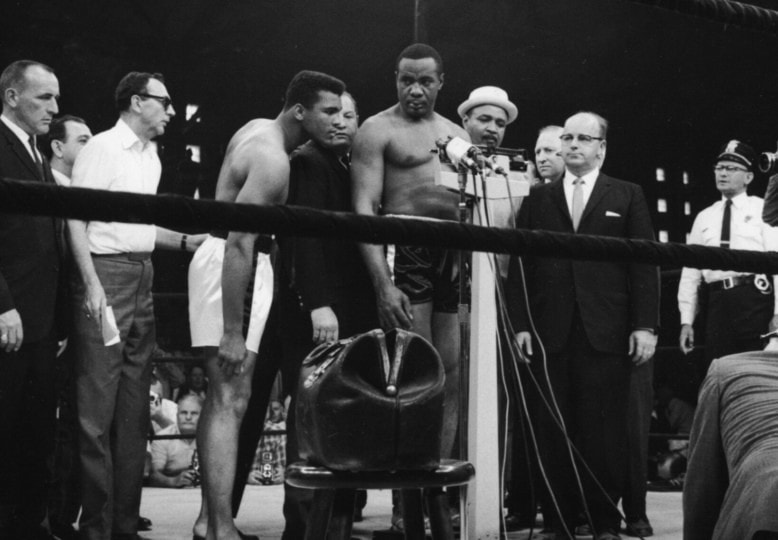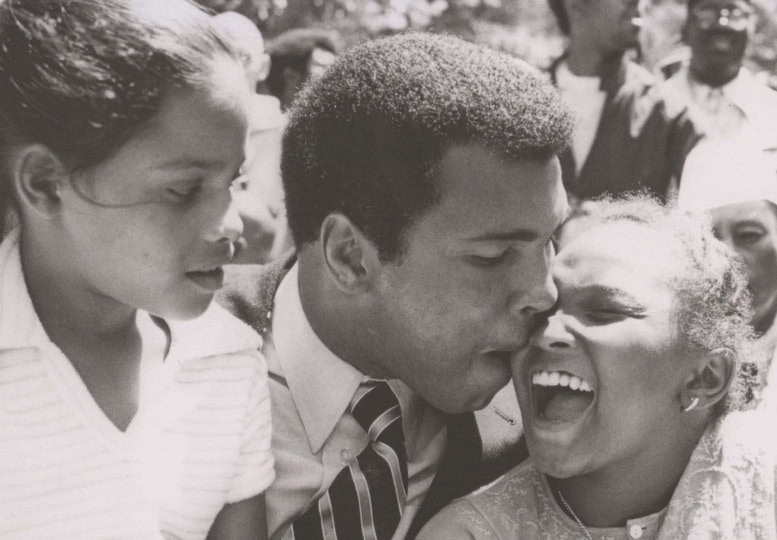Ali Center: 20 Years of Greatness
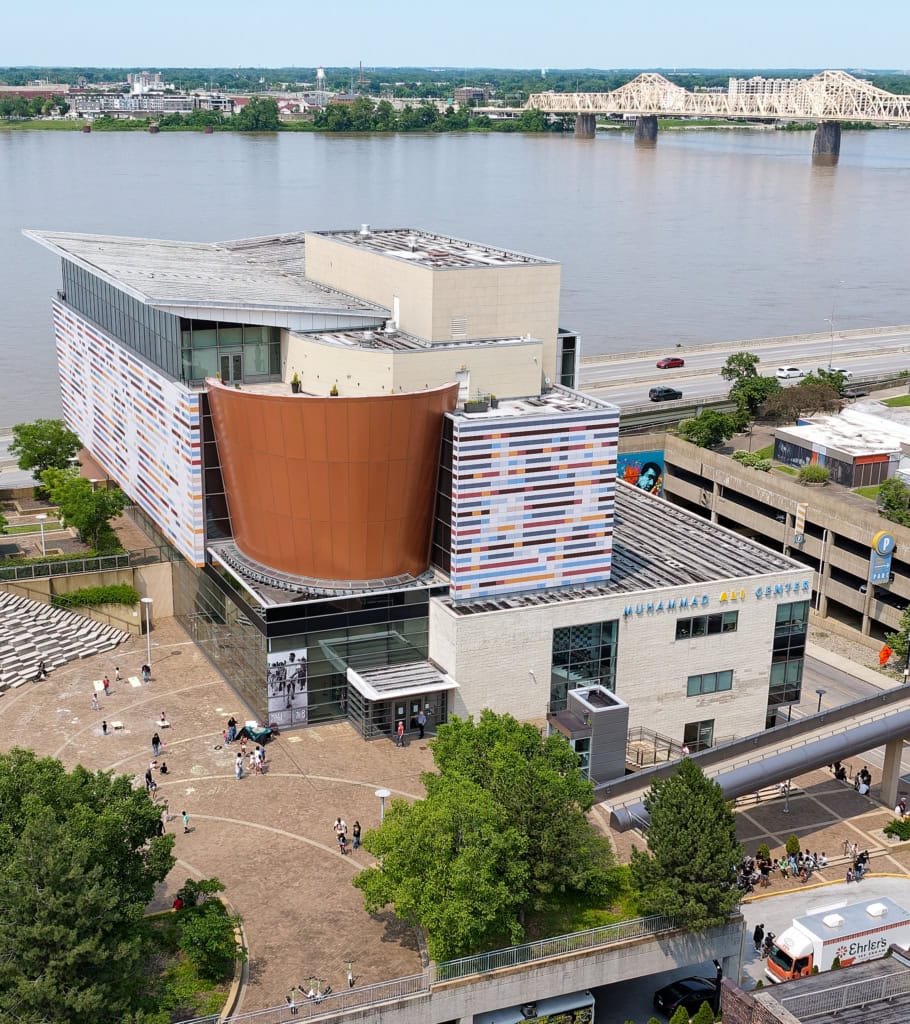
20 Years of Greatness
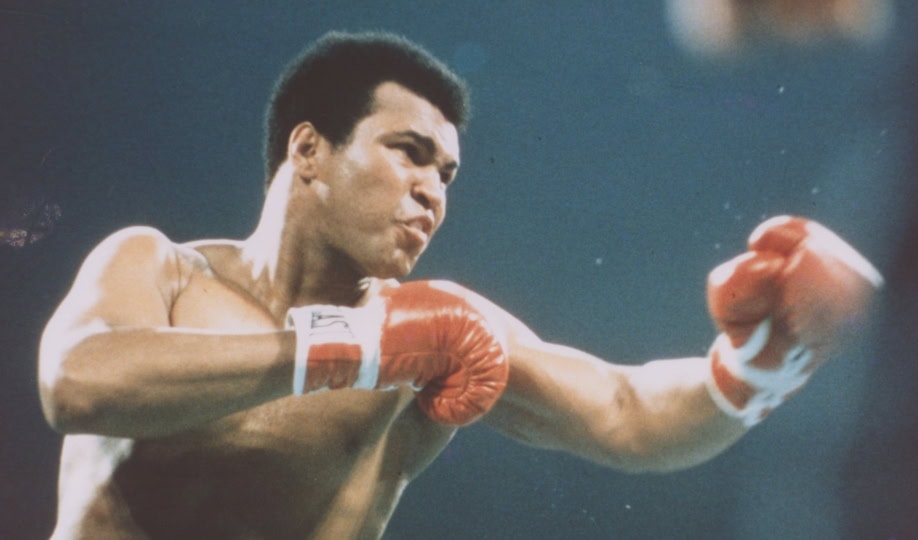
Sharing the Legacy
Almost twenty years ago, Muhammad and Lonnie Ali realized their long-held dream of opening a museum dedicated to sharing the legacy of The Greatest. As the Ali Center nears this milestone, we reflect on our beginnings and on the impact of the man who captured the world’s attention with his tenacious spirit, both in and out of the ring.
“I am an ordinary man who worked hard to develop the talent I was given. I believed in myself, and I believe in the goodness of others. Many fans wanted to build a museum to acknowledge my achievements. I wanted more than a building to house my memorabilia. I wanted a place that would inspire people to be the best that they could be at whatever they chose to do, and to encourage them to be respectful of one another.” – Muhammad Ali
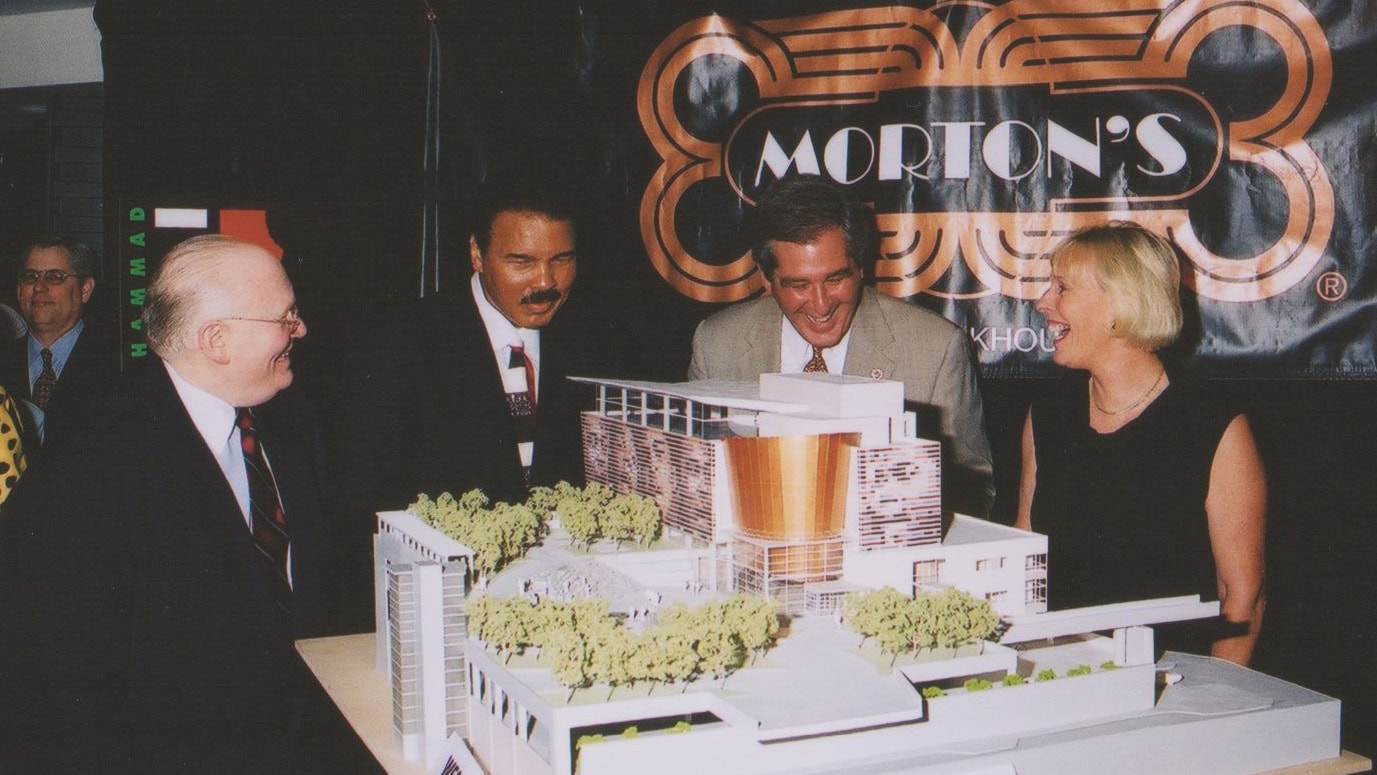
More than a Museum
The monumental effort to create a museum and cultural center began to take shape in the mid-1990s. The Ali family made a deliberate and heartfelt choice in selecting Muhammad’s hometown of Louisville as the site for their long-envisioned center. Born and raised in the city, Muhammad began his legendary journey here, rising through the amateur boxing ranks, winning an Olympic gold medal, and launching one of the most iconic professional careers in sports history. His life was lived on the world stage; he fought on nearly every continent, traveled extensively and had strong ties to many communities. But for Muhammad and Lonnie, there was never a question: the Muhammad Ali Center belonged in Louisville, Kentucky.
From its inception, the Ali Center was designed not merely as a museum, but as a living, breathing source of inspiration. Its exhibits, engaging programs, global outreach and innovative media experiences are all rooted in the Six Core Principles that defined Muhammad’s life: Spirituality, Confidence, Conviction, Dedication, Giving, and Respect. These ideals serve as guiding stars, encouraging every visitor to reflect, explore, and unlock their own potential.
Instrumental in bringing this dream to life was an eclectic team of local, national and international supporters who believed in the power and importance of Muhammad’s story. Among the Ali Center’s most passionate champions was Ina Brown Bond, a descendant of one of the original members of the Louisville Sponsoring Group, who brought a deep personal connection and a sense of generational continuity to the project. Larry G. Townsend, another dedicated advocate, was chosen by the Ali family to lead the critical fundraising campaign that ensured the Ali Center would become a reality. Both played vital roles in helping bring the Ali Center to life and served in leadership roles during its early years. According to Lonnie Ali, their contributions were so essential to the Ali Center’s actualization, that it simply would not have come to fruition without them.
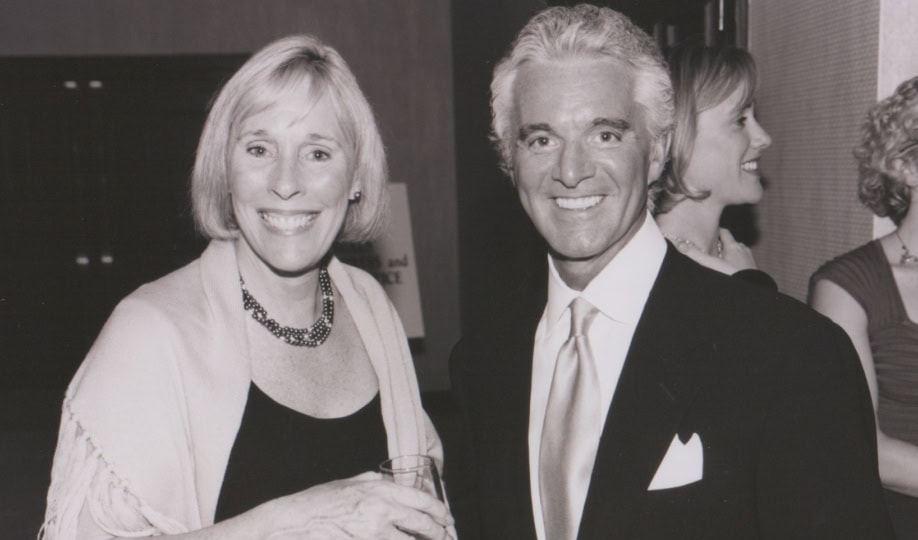
Larry Townsend and Ina Brown Bond – A Prominent Part of the Ali Center Tapestry
An Essay by Lonnie Ali
When I reflect back to the very beginning of Muhammad and my idea to create a place and space that would preserve Muhammad’s legacy long after he had left us and carry his legacy forward to future generations, I immediately think of Larry Townsend, who I dearly love to this day. Without him, there would not be a Muhammad Ali Center. Larry literally took my hand and led the entire initiative and vision of what the Ali Center could be. He brought together an influential group of Louisvillians, whose families had played a pivotal role in the early professional career of a young Cassius Clay, eventually securing local and state support.
If Larry led the vision of the Muhammad Ali Center, Ina Brown Bond led the massive fundraising efforts to make the Ali Center a reality during Muhammad’s lifetime. Ina’s father, W. Lyons Brown, was a founding member of the Louisville Sponsoring Group. A group of 11 prominent Louisville businessmen who launched and managed Muhammad’s young professional boxing career. Ina, Lyons’ only daughter, was not allowed to attend Cassius’s professional boxing bouts, unlike her brothers. However, Ina became one of Larry’s first supporters of the vision, understanding the global importance of Muhammad’s legacy.
Not only did Ina become a supporter of the Ali Center and Muhammad’s legacy, she was the force behind the fundraising that enabled the Ali Center to be built and operate. And she didn’t stop there. She continued to hold leadership and fundraising roles for many years. Without Ina’s personal generosity and that of the Brown family, the Ali Center would still be a concept drawing on a white board.
The Ali Center became Ina’s passion project. She loved Muhammad and everything he stood for, including the Six Core Principles that guided his life. Much like Muhammad, she believed his life could and should serve as a guide for others to achieve their own personal greatness and inspire future generations of changemakers, ensuring a better tomorrow for all people.
To Ina and Larry, Muhammad and I owe much. I’ll never be able to properly express my and the Ali family’s gratitude for everything these two exceptional people have done and meant to Muhammad’s legacy. They are now a prominent part of the rich tapestry that is Muhammad’s life. Ina and Larry will always be two brightly colored ribbons woven through it, always remembered with deep love and appreciation.
Check out our Digital Museum for additional collections items from the Muhammad Ali Center.
Watch Interview
Muhammad Ali spoke with former WLKY Sports Director Fred Cowgill on why the Ali Center should be built in Louisville. (Aired in 2016)
Watch Interview
Muhammad Ali spoke with former WLKY Sports Director Fred Cowgill on why the Ali Center should be built in Louisville. (Aired in 2016)
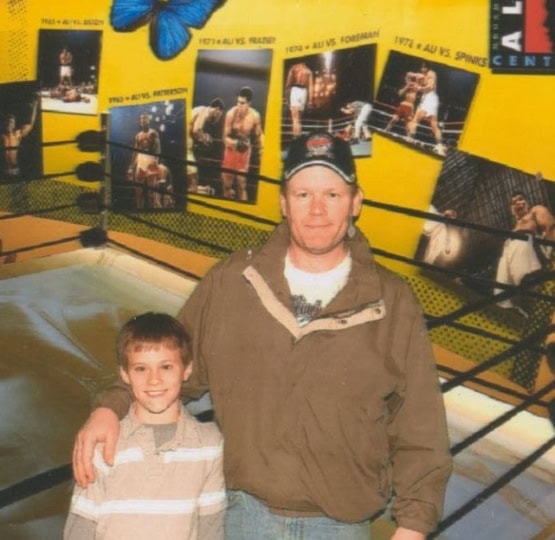
Our First Guest
Butch Zurbriggen, a Muhammad Ali superfan, didn't miss his chance to be one of the first to experience the museum.
Always There for the Champ
Butch Zurbriggen is an avid fan of Muhammad Ali. From watching fights to passing along his love for the Champ to his children, Butch has followed Muhammad’s career his whole life. He has also collected Muhammad Ali memorabilia for years.
In the late 1990s, Butch Zurbriggen attended a dinner in New Jersey where Muhammad Ali and Joe Namath were present. While there, Butch’s son gave Muhammad a letter and pictures of the Ali memorabilia they had collected and hoped to donate to the proposed Center. It was there that Butch first heard rumors of an institution to honor the boxing titan.
Much to his surprise, Butch received a call the next day. Muhammad called to thank him personally for being a fan. They spoke for around 10 minutes before saying goodbye, with Ali saying he would try to visit soon. Though he was never able to make it for a visit to Ohio, the Champ’s words and intentionality meant the world to Butch.
His first experience at the Muhammad Ali Center, when it officially opened in 2005, was, in his words, “probably different than most people’s.” He and his 9-year-old son camped outside of the Ali Center in November for the public opening. The Ali Center opened at 9 a.m. on Monday, November 21. Local reporters from the Courier-Journal and other media outlets were there to capture the inaugural moments. Butch and his son were approached for an interview, and no one was able to enter the building until they had finished. Though his son still talks about their urban camping experience, sleeping and waiting in 30-degree weather was worth it to Butch, who is still grateful to know they were the first to buy tickets.
A Second Home
Butch continues a tradition he started in 2016: visiting Muhammad Ali’s gravesite every year on the anniversary of his passing. Like many others, when Butch heard about Muhammad’s death, he made plans to visit the town that raised The Greatest. And every year since, you can find Butch sitting at his graveside on June 3rd.
This year during his annual trek to Louisville, while visiting the Ali Center, he watched a group of junior high school students who seemed genuinely interested as they walked around the exhibits. It was fairly clear people around him didn’t seem to know who Muhammad Ali was. “I was so happy and thankful that these kids got to learn about Muhammad Ali—the Greatest. I was so grateful to the Ali Center for that. I wish we had something like that here for our kids.” He coaches girls’ softball, and he said they don’t even know who Muhammad is.
Today, Butch only collects Muhammad Ali books. He’s nearly reached 600, with 582 in his collection so far. He says every year that he would absolutely live in Louisville just to be a volunteer at the Muhammad Ali Center, if he could.
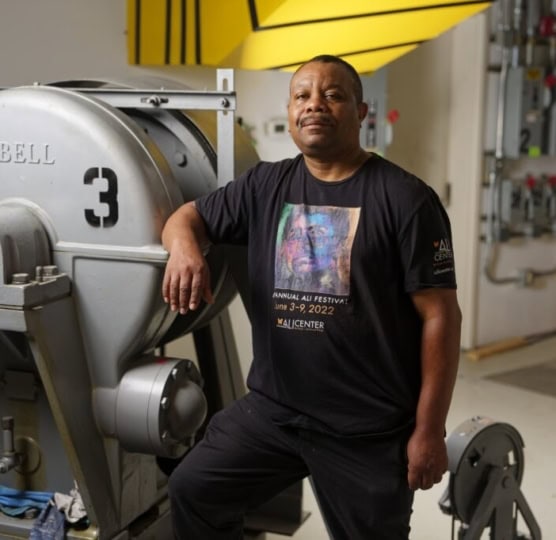
Behind the Scenes with Anthony Ford
Deserving of the spotlight, one man behind the public eye makes sure all guests have the greatest experience within the Ali Center.
"“The fight is won or lost far away from witnesses – behind the lines, in the gym, and out there on the road, long before I dance under those lights.”"
Dedication to the Greatest Experience
So it was with the dedication of the fighter, so it is with the heart of the Ali Center. Much of what goes into making sure visitors have the safest, smoothest experience possible, and all team members can do their jobs effectively, happens far away from the public eye.
For nearly the entire life of the Ali Center, those efforts have been led by one man, Anthony Ford. For the last 19 years, Ford has guided the team responsible for maintenance, safety, and building management. A quiet, steady force at the heart of the team, Ford quietly performed his duties with excellence under five Ali Center presidents, three Louisville mayors, both during Muhammad’s life and after.
“I guess some faces have changed,” Ford said. “But the mission to make the Ali Center great is still the same.”
It’s that focus that inspires Ford through long hours, nights and weekends, ensuring the Center is safe and ready for anything. When a fire in the neighboring parking facility threatened the structure in Fall 2024, Ford was the first person on-site at 3 a.m. and worked around the clock in the weeks after to make sure the building was tended to and reopened as soon as possible.
Ford’s motivation comes from a deep love of the Ali Center, and an understanding of what it means to kids from Louisville and beyond.
“The Ali Center is important in my eyes because I was raised in a one-parent household,” Ford said. “And [with] no one to inspire me outside the household, I think the Ali Center can give you hope and inspire you to follow your dreams.”
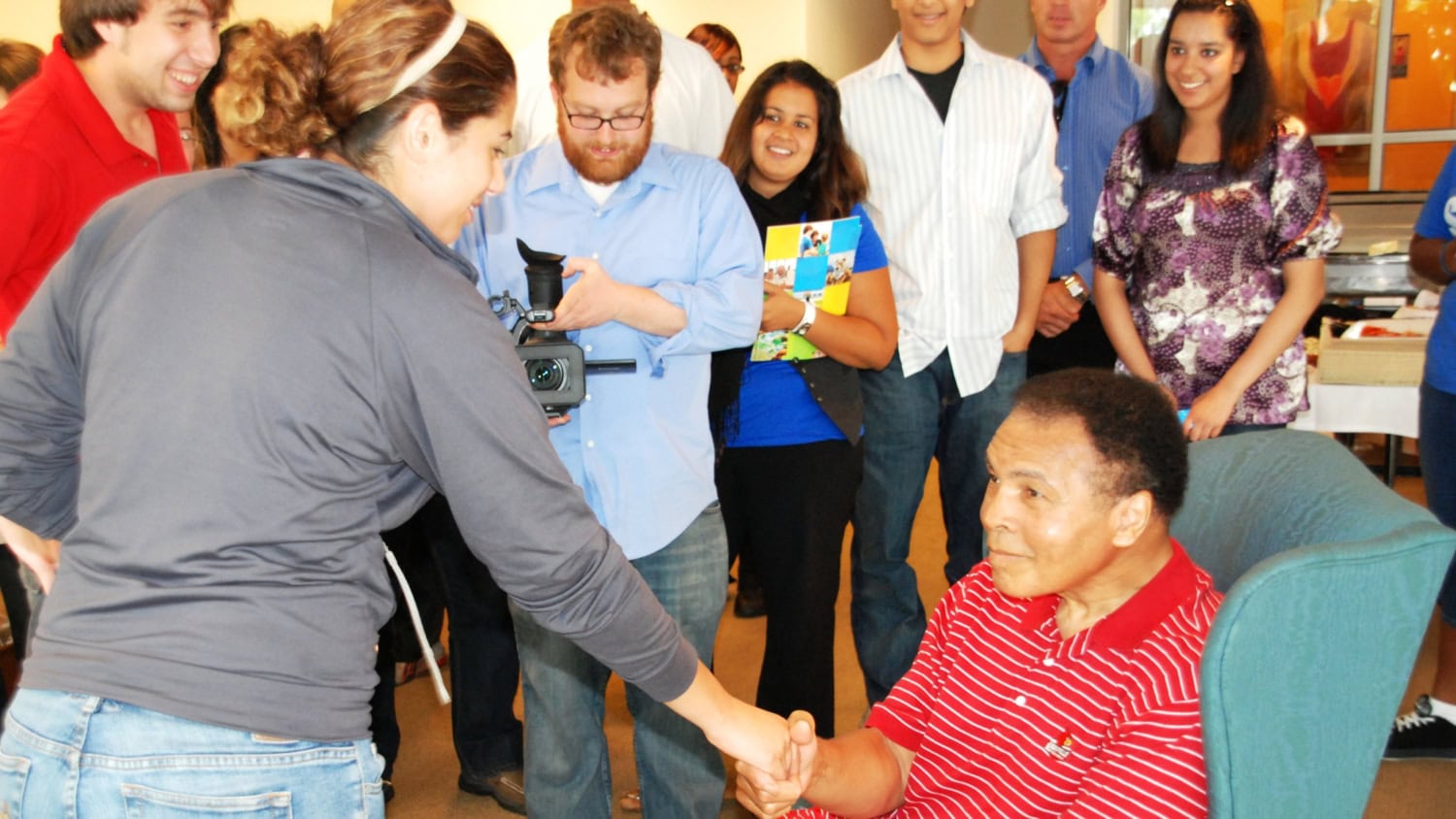
Ford’s time started at the Ali Center in 2010, and he fondly remembers when Muhammad would come to the Ali Center to meet staff and share a magic trick or a laugh. He recalls the Champ attending employee holiday parties and sharing special moments with them and their families.
“The funniest story during my time is when Ali was leaving the Center and he wanted to meet all the employees,” Ford said. “So, the women went first to meet him, and he gave them all a hug. The men were next, my coworker from the maintenance department tried to give Ali a hug. Ali raised his fist up in a boxing form… I was like ‘You better just shake Ali’s hand before he knocks you out.’ Ali shook his hand and gave him the crazy sign.”
Ford was also a crucial part of the week after Muhammad’s passing in June 2016. During the days that followed, hundreds of thousands of mourners flocked to Louisville and the Ali Center. Admission was free, and more than 27,000 visitors explored the exhibits. Ford was there for it all, a moment he said that still resonates.
“What I remember the most is when Ali passed away and the city celebrated the life of Ali,” Ford said. “People all over the world came to see Ali, crime went down, people from out of town were coming up to me and saying, ‘the city should celebrate the life of Ali like this every year.’”
It’s not hard to see the similarities between Ford and Ali. Though Ali in his prime was much more boisterous, and Ford leads with a trademark quiet nature, they both attack their work with resolve and dedication, and focus on excellence. Like Ali, Ford’s been known to make a funny quip, and when he speaks, he lends nuance and fresh perspective.
When asked what his time at the Ali Center’s taught him, Ford says “The confidence to do more, take risks, and achieve goals.”
With retirement approaching, Ford is starting to reflect on his time with the Greatest and protecting the center that bears Ali’s name.
“It’s been a great journey because I got to see the effect Ali had on people with my own eyes,” Ford said. “And now that he’s not physically here, he’s still got the same effect on people today. And I think that was the plan.”
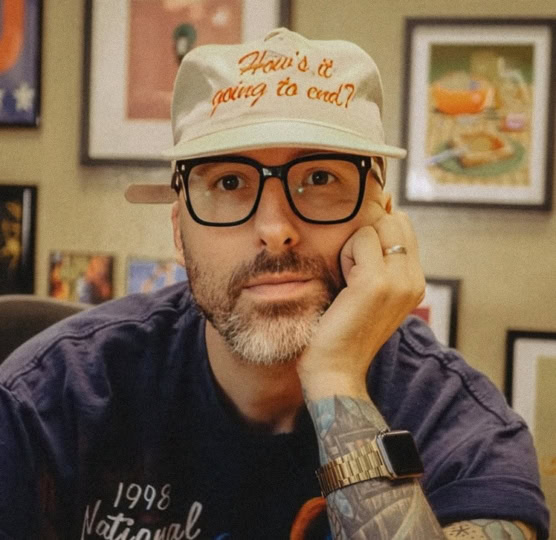
A New Perspective with Cory Eaves
Cory, the newest member of our Marketing team, showcases the importance of capturing Ali's legacy and presenting it to new generations.
Elevating our Voice
An Essay by Cory Eaves
The Muhammad Ali Center isn’t just a museum. It’s a living, breathing extension of Muhammad Ali’s values. It celebrates not only who he was, but what he stood for.
I believe empathy and compassion are the two most important qualities a human being can possess. Within this organization, those values aren’t just printed on our creative, they’re practiced. The Ali Center is oozing with humanity, and being part of a team that leads with their hearts makes coming to work an absolute joy.
To me, carrying Ali’s legacy forward means being intentional about everything we create. It means telling stories that honor his truth while also challenging the next generation to find their own voices. It means centering communities, elevating our youth, and championing justice across the globe. My hope is that the work I do here not only celebrates who Ali was but invites others to live like he did. With boldness, compassion, and a relentless belief in themselves.
I also believe deeply in our President & CEO, DeVone Holt. His vision for the future of the Ali Center is bold, creative, and people first. When your leader moves with integrity, passion and purpose, it creates a ripple effect throughout the entire organization. That energy is not only rare, but contagious.
As human beings, we spend most of our lives at work. That reality has always stuck with me. If I’m going to invest that much of myself in something, I want it to matter. I want to be proud of the impact I’m making. The Ali Center gives me that in abundance. I’m able to use my skills to amplify stories that matter and to help foster the legacy of a man who was truly the Greatest of All Time.
Watch Feature - Muhammad Ali Center Showcase
Hear from three Ali Center staff members about their experience with Muhammad Ali, the Ali Center, and their work inspiring greatness.
Watch Feature - Muhammad Ali Center Showcase
Hear from three Ali Center staff members about their experience with Muhammad Ali, the Ali Center, and their work inspiring greatness.
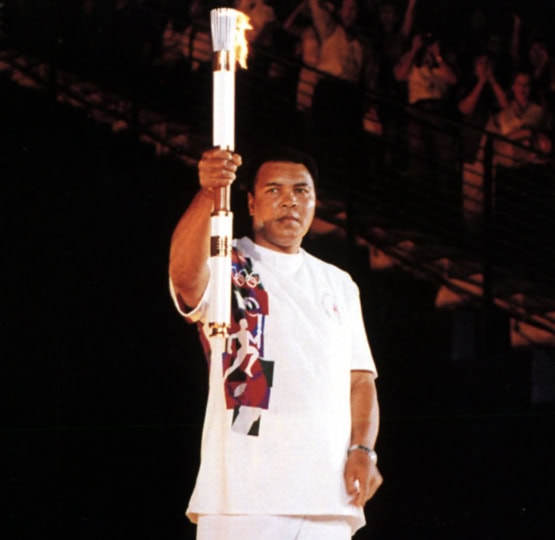
The Vision for the Future
The Muhammad Ali Center is also looking forward to preserve Ali's legacy for decades to come.
Bearing the Torch, Lighting the Way
Our work is far from over.
Today, we grapple with the challenge of keeping Muhammad Ali’s story relevant for generations that barely know his name, who are growing up in a world where Muhammad Ali is no longer an athletic force. There are children today who won’t understand the references to Muhammad Ali in music, television, or in pop culture at large because he passed away before they were born.
His cultural presence, once undeniable, risks becoming a distant echo if we don’t work intentionally to preserve and share it.
As we approach the Muhammad Ali Center’s 20th anniversary, we are challenging ourselves to find new ways to bring Muhammad’s values to life for a changing world; reimagining how we tell his story, creating new programs and digital content, and expanding partnerships that amplify his message globally. Tools like the Muhammad Ali Index help us measure and promote the qualities he stood for, while ongoing educational efforts and community engagement keep his spirit alive in everyday lives.
Muhammad shook up the world, now his legacy depends on us. Here are some ways you can be a part of that work:
Donate to the Ali Center to help enhance our programming and community outreach.
Become an Ali Center Member and receive exclusive perks while showing your support of our mission.
Follow us on social media: Facebook, Instagram, Threads, TikTok, YouTube, X.
Learn more about the Muhammad Ali Index and show your commitment to compassion by signing the Ali Compassion Pledge.
